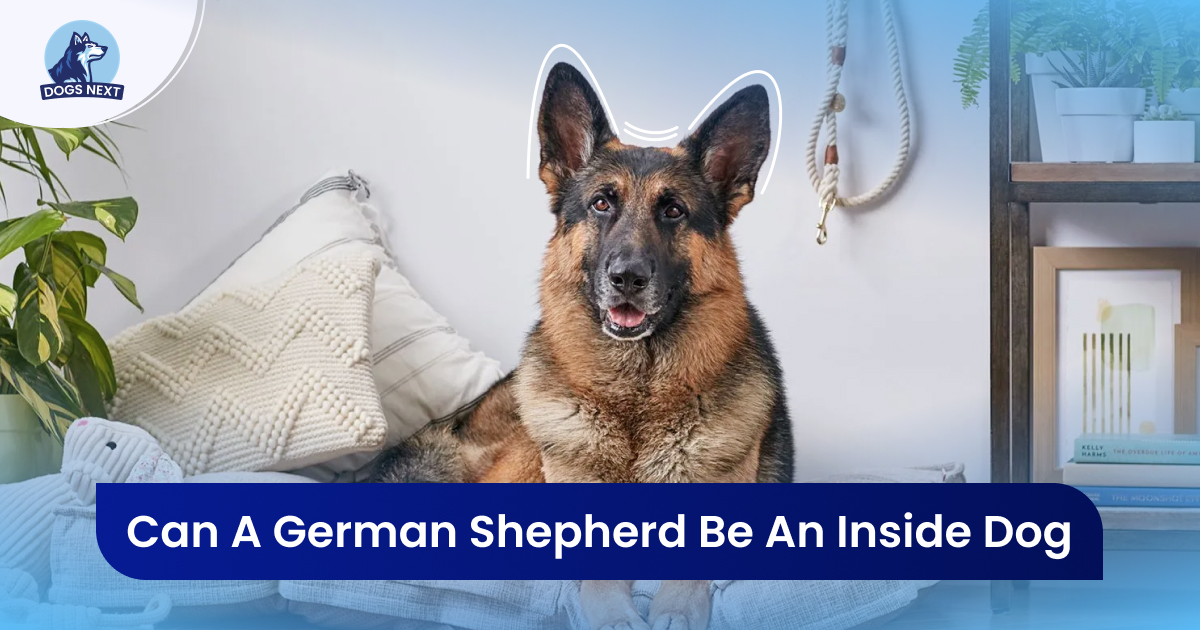Yes, German Shepherds can be inside dogs and can adapt well to living indoors with their families. While they are known for their versatility as working dogs, German Shepherds also make excellent indoor companions.
While German Shepherds are often used as working dogs and require plenty of exercise and mental stimulation, they can certainly thrive as indoor pets when given proper care and attention.
In this article, we will explore the characteristics of German Shepherds, the pros and cons of keeping them indoors, and ways to keep them mentally and physically stimulated while living indoors.
Table of Contents
Characteristics of German Shepherds
Some of the characteristics of German Shepherds are mentioned below:
- German Shepherds are a medium to large-sized breed, typically weighing between 50 to 90 pounds.
- They have a muscular build and a dense double coat that can be black and tan sable or all-black.
- They are intelligent, loyal, and protective dogs that have a strong work ethic and a willingness to please their owners.
- German Shepherds are highly trainable and excel in obedience training, search and rescue, and police work.
- They have a life expectancy of 9 to 13 years.
- They are known for their versatility, making them popular choices for families, law enforcement, and the military.
- They have a high energy level and require plenty of exercises and mental stimulation to prevent destructive behavior.
- German Shepherds can be reserved with strangers and may be protective of their families, making them great watchdogs.
- They have a tendency towards hip and elbow dysplasia, which is why it’s important to choose a reputable breeder and keep them at a healthy weight.
Pros and Cons of Keeping a German Shepherd Indoors
Keeping a German Shepherd indoors has its pros and cons.
- One of the biggest benefits is that they can be great companions for families living in apartments or houses without yards.
- They are also protective of their families and can make great watchdogs.
However, there are also drawbacks to keeping a German Shepherd indoors, such as their high energy levels, exercise needs, and potential behavior concerns.
It’s important to carefully consider these factors before deciding to keep a German Shepherd as an indoor dog.
How to Train and Socialize German Shepherds to Keep Them Indoor?
Proper training and socialization are essential to keep German Shepherds indoors. They need plenty of exercises and mental stimulation to prevent destructive behavior, such as chewing or digging.
Training:
- Start training your German Shepherd from an early age, as they are highly trainable and responsive to positive reinforcement.
- Focus on obedience training, teaching your dog basic commands such as sit, stay, come, and heel.
- Use positive reinforcement techniques such as treats, praise, and toys to encourage good behavior.
- Be consistent in your training, using the same commands and rewards each time to reinforce good habits.
- Provide plenty of mental stimulation through interactive toys and games, as German Shepherds have a high energy level and require mental stimulation to prevent destructive behavior.
- Consider enrolling your German Shepherd in obedience classes or working with a professional trainer to enhance their training and socialization.
Socialization:
- Socialize your German Shepherd from an early age, introducing them to a variety of people, places, and experiences.
- Expose them to different sounds, smells, and environments to help them become well-adjusted and confident.
- Encourage positive interactions with other dogs and animals, but always supervise their interactions to ensure their safety.
- Use positive reinforcement techniques to encourage good behavior during socialization, rewarding them for calm and friendly interactions.
- Be patient and consistent in your socialization efforts, as it can take time for German Shepherds to become comfortable in new environments and with new experiences.
By providing proper training and socialization, German Shepherds can become well-adjusted indoor pets that are well-behaved and happy.
Indoor Activities and Enrichment
To keep an indoor German Shepherd mentally and physically stimulated, there are plenty of activities and enrichment opportunities to consider. Puzzle toys, such as treat-dispensing balls or interactive feeders, can help keep their minds engaged.
Playing games like hide-and-seek or tug-of-war can provide physical exercise and bonding time with their owners.
Indoor agility courses or obedience training classes can also be a fun way to provide exercise and socialization.
Is German Shepherd Inside or Outside Dog
German Shepherds can be both inside and outside dogs, depending on various factors such as the dog’s temperament, the owner’s lifestyle, and the environment in which the dog lives.
When kept inside, they can be trained to be well-behaved and obedient pets. However, German Shepherds also require a lot of physical activity and mental stimulation to prevent boredom and destructive behavior.
When kept outside, German Shepherds need a secure, spacious, and comfortable area to run and play. They should also have access to shelter, clean water, and proper nutrition. Keeping a German Shepherd outside can also help prevent damage to indoor furniture and flooring caused by shedding or accidents.
Whether a German Shepherd is an inside or outside dog depends on the individual dog’s needs and personality, as well as the owner’s ability to provide proper care, training, and socialization. Some German Shepherds thrive inside as part of the family, while others enjoy spending time outside in a secure and comfortable environment.
Where a German Shepherd Should Lie
They should have a comfortable and secure place to rest, whether indoors or outdoors. Here are some options for where a German Shepherd can lie:
Indoors: Your German Shepherd can lie on a comfortable dog bed or in a crate.
Outdoors: Provide your German Shepherd with a sheltered area that is protected from the elements, such as a doghouse, and a comfortable bed or blanket.
| Pros of Outdoor Sleeping | Cons of Outdoor Sleeping |
| Provides your dog with more space to move around and explore | Can be less secure than sleeping inside |
| Allows your dog to enjoy the fresh air and natural light | May not provide adequate protection from the elements |
| Can be less disruptive for family members who are sensitive to noise or allergic to dogs | May not be practical if you live in a densely populated area |
| Maybe a better option for dogs who are anxious or restless indoors | Requires additional preparation and maintenance |
Should You Retain a German Shepherd That Causes Damage Outside?
If your German Shepherd is causing damage outside, it’s important to identify the cause and address the behavior. Here are some possible reasons why a German Shepherd might be causing damage outside:
Boredom: Your German Shepherd might be bored when inside the home alone and in need of more physical and mental stimulation.
Separation anxiety: Your German Shepherd might be experiencing separation anxiety if they are left alone for long periods of time.
Lack of training: Your German Shepherd might not be properly trained or socialized.
If your Shepherd is causing damage outside, consider consulting with a professional dog trainer or behaviorist to address the issue and provide your dog with appropriate outlets for their energy.
German Shepherds Allowed in Condos?
Many condos and apartment complexes have restrictions on the size and breed of dogs allowed on the premises. It’s important to check with your landlord or condo association to determine if German Shepherds are allowed in your building.
However, if you live in a condo or apartment, it’s important to provide your German Shepherd with enough exercise and mental stimulation to keep them happy and healthy.
A German Shepherd Can Live in A Small Home
While German Shepherds are known for their athleticism and need for physical activity, they can adapt to living in a small home if they are provided with enough exercise and mental stimulation. Here are some points to consider when keeping a German Shepherd in a small home:
Exercise: German Shepherds require daily exercise, so make sure you have access to a nearby park or open space where you can take your dog for walks or runs.
Mental stimulation: German Shepherds are intelligent dogs that require mental stimulation, so provide them with puzzle toys, training sessions, and interactive games.
Comfortable space: Provide your German Shepherd with a comfortable place to rest and relax, such as a dog bed or crate.
Does The German Shepherd Existing Inside Consider Age?
As German Shepherds age, they become more susceptible to health problems and may require special attention. Here are some factors to consider when keeping an older German Shepherd inside:
Joint Problems: As German Shepherds age, they may experience joint problems such as arthritis or hip dysplasia. Keeping them inside can help minimize the strain on their joints.
Incontinence: Older German Shepherds may have difficulty controlling their bladder or bowels, which can be difficult to manage if they are kept outside. Keeping them inside can make it easier to manage incontinence issues.
Comfort: Older German Shepherds may have a harder time regulating their body temperature and may be more sensitive to extreme heat or cold. Keeping them inside can help keep them comfortable and safe.
A Few Quick Suggestions for Managing Your German Shepherd’s Indoor Time
Here are some tips for managing your Shepherd’s indoor time:
- Provide plenty of exercises and mental stimulation to keep them entertained and prevent destructive behavior.
- Make sure they have a comfortable and safe place to rest, such as a dog bed or crate.
- Use positive reinforcement training techniques to reinforce good behavior and discourage bad behavior.
- Set boundaries and rules to establish a routine and prevent confusion.
- Consider using interactive toys and puzzles to keep them mentally stimulated and prevent boredom.
Finally, make sure to spend quality time with your German Shepherd to strengthen your bond and show them affection.
Frequently Asked Question
Q: Do German Shepherds need to be outside to be happy?
Ans: No, German Shepherds can be happy inside as long as they receive enough exercise and mental stimulation
Q: Can German Shepherds be left alone inside?
Ans: German Shepherds should not be left alone for long periods as they are prone to separation anxiety and can become destructive. It’s important to provide them with proper training and a safe space when unsupervised.
Q: Are German Shepherds indoor dogs or outdoor dogs?
Ans: German Shepherds can be either indoor or outdoor dogs, depending on their individual needs and living situation. They do best when they have access to both indoor and outdoor spaces and are near their family.
Q: How can I prevent my German Shepherd from causing damage inside?
Ans: Providing proper training, exercise, and mental stimulation can help prevent destructive behavior. You can also use a crate or playpen to keep your dog in a safe space when unsupervised.
Q: Are German Shepherds good indoor pets for families with children?
Ans: German Shepherds can be great indoor pets for families with children as long as they are properly socialized and trained. It’s important to supervise interactions between children and dogs and teach children how to interact safely with dogs.
Conclusion
German Shepherds can be great indoor dogs as long as their needs are met. It’s important to provide them with plenty of exercises, mental stimulation, and a designated space to rest. If you’re considering keeping your German Shepherd inside, make sure you understand the pros and cons and are prepared to meet their needs.

I’m David, an expert contributor and writer, with two furry friends of my own, I know the challenges of raising and caring for dogs. From training to nutrition and health, my goal is to provide valuable insights and advice to help create strong bonds and happy, healthy lives. Find me in Twitter.




